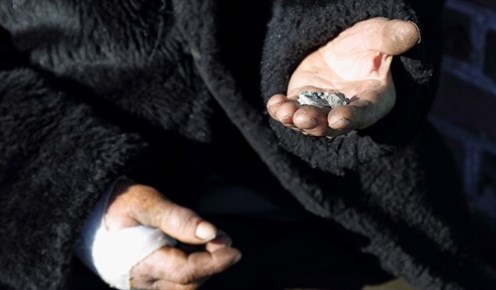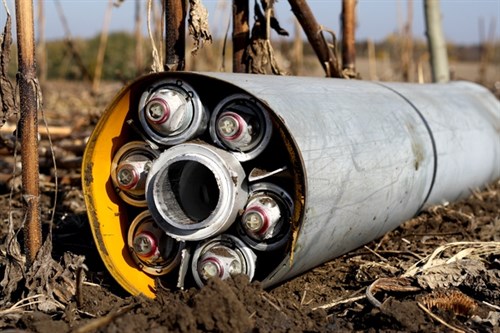Cluster Munitions Use in Ukraine 2014-2015
Use of Cluster Munitions in Ukraine in 2014-2015

Ivan Fedorovich, 83, holds fragments that wounded him in his hand and stomach during a cluster munition attack on Hrodivka on February 10. © 2015 Human Rights Watch
Cluster munitions were used in the east of Ukraine in 2014–2015.
Ukraine Government forces and Russian-backed rebel forces used cluster munitions in the east of Ukraine in January and February 2015, according to in-depth research by Human Rights Watch made public on 19 March 2015. At least 13 civilians were killed, including two children.
Evidence was found of attacks using cluster munition rockets in at least seven villages, towns, and cities between 23 January and 12 February 2015, with some locations hit multiple times.
The weapons used were surface-fired 300 millimeter Smerch (Tornado) and 220 millimeter Uragan (Hurricane) cluster munition rockets, which deliver 9N210 or 9N235 antipersonnel fragmentation submunitions. Information about cluster munition rocket attacks in other locations, including photos of remnants, was gathered as well.
The Cluster Munition Coalition called on both Ukraine and Russia to publicly renounce the use of cluster munitions by joining the Convention on Cluster Munitions. It also referred to Ukraine and Russia's own respective public condemnations of the use of cluster munitions, and called on them to align their actions with their speech.
Use of Cluster Munitions in Ukraine in 2014

Remnants of a misfired Uragan cluster munition rocket lying in a field in territory controlled by the Ukrainian government near Novomykhailivka, Ukraine on October 14, 2014. © 2014 Ole Solvang/Human Rights Watch
In October 2014, during a week-long investigation in eastern Ukraine, Human Rights Watch documented widespread use of cluster munitions in fighting between government forces and pro-Russian rebels in more than a dozen urban and rural locations. While it was not possible to conclusively determine responsibility for many of the attacks, the evidence points to Ukrainian government forces’ responsibility for several cluster munition attacks on Donetsk. While not definitive, circumstances indicated that anti-government forces might also have been responsible for the use of cluster munitions, according to Human Rights Watch.
Human Rights Watch found evidence of surface-fired 220mm Uragan (Hurricane) and 300mm Smerch (Tornado) cluster munition rockets. In the 12 incidents documented by Human Rights Watch in October, cluster munitions killed at least 6 people and injured dozens. The real casualty number from use of cluster munitions in the conflict is probably higher, Human Rights Watch said, since it has not investigated all allegations of cluster munition use. Also, in some cases, it was not possible to determine what weapon caused the death or injury because several types of explosive weapons were used at the same time in the same area.
In early July 2014, evidence also strongly indicated ground-launched cluster munitions were used in two separate locations in eastern Ukraine during fighting between Ukrainian government forces and armed insurgents. On 3 July, the remnants of a 300mm 9M55K Smerch cluster munition rocket and a 9N235 fragmentation submunition were identified from photographs reportedly taken at Kramatorsk in eastern Ukraine. On 11 July, photographs taken by the Associated Press at an insurgent base at Slavyansk, which was abandoned during the Ukrainian government’s early July take-back of the town, showed the remnants of at least eight 220mm 9M27K-series Uragan cluster munition rockets and at least three fragmentation submunitions that are either 9N210 or 9N235.
According to the Associated Press, the remnants at Slavyansk were collected and destroyed by Ukrainian government explosive ordnance disposal teams. During August 2014, remnants of both Smerch and Uragan cluster munition rockets were documented at multiple locations in territory controlled by Ukrainian government forces and in territory controlled by armed insurgents. (See examples here, in this tweet, and here.)
Ukraine has repeatedly and vehemently denied using cluster munitions at any time during the ongoing conflict. Andriy Lysenko, spokesman of National Security and Defense Council, stated on 21 October, “For the period of anti-terrorist operation the Ukrainian troops didn’t use any kind of weapons banned by international treaties. This includes use of cluster bombs.” The Ukrainian government remarked that “the use of such bombs and shells goes against the interest of the government” as it would violate their commitment to “never use force against civilians” and the “multitude of unexploded ordinance in the wide area covered would create a menace that, once liberated, the Ukrainian government would have to eliminate.”
In a letter to the editor of the New York Times published 30 October 2014, the Foreign Minister of Ukraine said the reports of Ukraine responsibility for cluster munition use were only an attempt by its detractors to “mar Ukraine’s name in the eyes of the world and its own citizens.” Indeed, he noted, “Ukraine is the last party that would be interested in making the local population hate the central government in Kiev.”
Cluster Munition Coalition Call
- Both sides should initiate independent investigations and make findings public
- All parties to the conflict in Ukraine should renounce the use of cluster munitions, an internationally banned weapon
- Both Ukraine and Russia should accede to the Convention on Cluster Munitions
- Cluster munition stockpiles should be declared and destroyed
- Cluster munition remnants must be cleared and destroyed as soon as it is safe to do so and international support given to enable clearance efforts
- Through risk education, clear warnings must be given to communities about the terrible danger unexploded bomblets pose
- The victims of cluster munitions and other explosive weapons must be supported
- Governments worldwide should continue to condemn use of cluster munitions in Ukraine and call for all states to join the Convention on Cluster Munitions
RESOURCES
Below are links to resources on cluster munition use in Ukraine, including condemnations, testimonies, videos and quotes from experts.
Condemnations
-
To date, at least 52 states have condemned the use of cluster munitions in Ukraine, of which 27 have made direct national statements, and the others associated themselves with an EU statement expressing concern about use in Ukraine. Many additional states have condemned the use of cluster munitions more generally in the context of recent use in Ukraine.
-
The Cluster Munition Coalition has expressed concern at the evidence of cluster munition use in eastern Ukraine and urged the government of Ukraine to investigate.
-
5MSP President of the Convention on Cluster Munitions, Costa Rica, joined all those condemning use, and said allegations of use in Ukraine were of “deep concern.” In its President’s Summary Costa Rica stated that at the 5MSP, States Parties to the Convention on Cluster Munitions committed to continue condemning, at all times, any use of cluster munitions by any actor, in any place and under any circumstances, in order to further stigmatize cluster munitions and their use.
-
UN Secretary General Ban Ki Moon said the reports of cluster munition use were “extremely alarming,” and called for “an end to use of these indiscriminate weapons.”
-
During a 24 October United Nations Security Council debate on the situation in Ukraine, 11 states expressed concern at the reported use of cluster munitions and, while noting Ukraine’s denial, called for an investigation to determine responsibility for use.
-
At a 30 October Organization for Security and Cooperation in Europe (OSCE) Council meeting in Vienna, the United States and other OSCE member states expressed concern at the cluster munition use and called for an investigation.
-
In a 15 November report on the human right situation in Ukraine, the OHCHR expressed concern about the reported use of cluster munitions, noting their use “in populated areas violates the laws of war due to the indiscriminate nature of the weapon and may amount to war crimes” and calling for a prompt and thorough investigation.
National Statements
At least 27 states have made national statements expressing concern, including Argentina, Australia, Austria, Chad, Chile, Colombia, Costa Rica, Croatia, Czech Republic, Ecuador, Ireland, Italy, Jordan, Lithuania, Luxembourg, Mauritania, Netherlands, New Zealand, Norway, Peru, Portugal, Russian Federation, Rwanda, Slovenia, Somalia, United Kingdom, and United States.
The following 52 states have condemned use of cluster munitions, naming Ukraine directly, in their national statements at 5MSP, and/or via the EU 5MSP statement, which requires the endorsement of all EU states and other states aligning themselves with the statement, and/or at UNGA 2014 First Committee on Disarmament and International Security and/or during a 24 October debate by the UN Security Council on the situation in eastern Ukraine: Albania, Argentina, Australia, Austria, Belgium, Bosnia and Herzegovina, Bulgaria, Chad, Chile, Colombia, Costa Rica, Croatia, Cyprus, Czech Republic, Denmark , Ecuador, Estonia, Finland, France, Germany, Greece, Hungary, Iceland, Ireland, Italy, Jordan, Latvia, Lithuania, Luxembourg, Macedonia FYR, Malta, Mauritania, Moldova, Montenegro, Netherlands, New Zealand, Norway, Peru, Poland, Portugal, Romania, Russian Federation, Rwanda, Serbia, Slovakia, Slovenia, Somalia, Spain, Sweden, Turkey, United Kingdom and USA.
Afghanistan, Armenia, Canada, Cote d’Ivoire, Cuba, El Salvador, Guatemala, Holy See, Japan, Lebanon, Mexico, Namibia, Palestine, Senegal, South Africa, Swaziland, Switzerland, Uganda and Zambia have also issued statements which include condemnation of the use of cluster munitions in the context of ongoing use in Ukraine, but have not specifically named Ukraine in those statements.
Testimonies
"At first I did not even realize what happened. I heard a loud bang, my ears were blocked. I felt a jolt in the back, and was thrown forward two or three meters. I was covered with dust and earth. It was like a wave. When my hearing recovered, I began to rise slowly. And then I felt something sticky running down my back and leg. I realized that it was blood."
A 37-year-old man who was working in his backyard during a uragan cluster munition rockets strike, Kyivskyi district, central Donetsk, 5 October 2014
"In the morning, Raisa went to the store and then the bomb fell. The bomb exploded and shattered the window. And she was standing next to the window. The fragments broke the window, which cut her carotid artery. People shouted: “Uncle Vanya! Uncle Vanya! Aunt Raya was killed!” I was thinking – that’s not possible because she was resting at home. But it turned out she went there. And was killed."
The husband of 80-year-old Raisa Lefterova, killed in a cluster munitions strike in Starobesheve, on 24 August 2014
"There was a rumbling sound. And then the bombs began to fall down – boom, boom, boom. The wave of the bombs moved across my house. We found many of them around here, unexploded. They were stuck in the ground. There were some in my neighbor’s garden. One struck the roof of my neighbor’s house."
Ivan Borlov, a local resident who was injured in a cluster munition strike in Starobesheve, on 24 August 2014
(Source: Human Rights Watch)
Videos
"Ukraine: Widespread Use of Cluster Munitions", Human Rights Watch, 20 October 2014 (view below)
Quotes from Experts
“It is shocking to see a weapon that most countries have banned used so extensively in eastern Ukraine. Ukrainian authorities should make an immediate commitment not to use cluster munitions and join the treaty to ban them.” Mark Hiznay, Senior Arms Researcher, Human Rights Watch
“Cluster bomb use by the Ukranian government and other forces in the conflict is an outrage. We have seen the longstanding humanitarian disaster from cluster bomb attacks in Iraq and Lebanon, and the ongoing cluster bombing of civilians in Syria. All states should loudly condemn use of cluster munitions in Ukraine and urge those not yet party to the Convention on Cluster Munitions to join immediately.” Megan Burke, Director, Cluster Munition Coalition
"Although Ukraine is not party to the convention that bans cluster bombs, firing cluster munitions into populated areas is still a violation of the laws of war, and may amount to war crimes." Ole Solvang, Senior Researcher, Human Rights Watch


